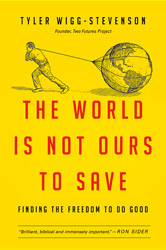What are we going to do about all those fired-up youngsters who are running around trying to save the world (and acting like they have only four minutes to do it)?
There has been a sea-change in the church. Like so often happens, Christianity seems to be swinging over to a concern with social justice and activism–at least among the young ones. But what happens when all these energetic, passionate, globally-concerned Christians realize that they can’t actually save the world? When they wake up to the reality that the job is too big, there are too many obstacles in the way, the “system” is unchangeable, and there is no quick fix or code that will crack the world’s problems? What happens when disillusionment sets in?
Tyler Wigg-Stevenson, author of The World is Not Ours to Save, has written a  remarkable book, in many ways. As the back cover says, he is the “founding director of the Two Futures Project, a movement of Christians in the global abolition of nuclear weapons.” So yeah, Tyler must know something about trying to save the world. This is a call for realism, sanity, and trusting in God for the final outcome–from a true, dyed-in-the-wool Christian activist.
remarkable book, in many ways. As the back cover says, he is the “founding director of the Two Futures Project, a movement of Christians in the global abolition of nuclear weapons.” So yeah, Tyler must know something about trying to save the world. This is a call for realism, sanity, and trusting in God for the final outcome–from a true, dyed-in-the-wool Christian activist.
The book is very well-written: he gives us some lively prose, interspersed with personal stories of his own activist background and passions, and it’s pretty theologically deep too (I wasn’t surprised to discover that he is currently pursuing a Ph.D. in theology). He connects political and social activism with biblical eschatology in a way that is not often done–and that is sorely needed.
One of Wigg-Stevenson’s main themes is that “Christian activism is grounded in claims about God.” I think his best insight, along these lines, has to do not with God per se, but with God’s desired future for creation. That is, his best insight is that Christian activism ought to be based in an adequate eschatology. What is the desired future for society, people, creation, etc.? The kingdom of God is one of peace, wellness of being, love, adequate resources for all, etc. So, we should live in anticipation of that future in the present and it certainly can’t hurt to try as best we can to make the present look like the future it will be. But we should also relax a bit, because the world isn’t ours to save, and we’ll just end up disillusioned if we try to do it ourselves. Accept our limitations. Recognize that only God will bring God’s kingdom–but don’t stop doing what God has impassioned you to do toward the eschatological vision of peace, mutuality, and shared prosperity.
Where Wigg-Stevenson is weakest, it seems to me, is in the choppy way he moves from his discussion of violence and war in the Old Testament to the present. Something seems amiss, or at least left out of the picture. He has an obvious passion for activism toward peace. But he also tells us that the “terrible passages of Scripture teach us that human life belongs wholly and only to God, full stop.” This does not mean, however, that “human beings can never kill.” In fact, the OT gives us examples of “divinely sanctioned life-taking” (indeed it does). He goes on to reason that, “Because all life belongs to God, those who take it must always be acting as God’s proxy, for God’s purposes–whether in the holy wars of the ancient Israelites, to advance God’s salvation history, or in human government, as the ministers of wrath against injustice.” (73). The conclusion of the matter, for this author-activist, is that “to kill outside the boundaries of God’s justice is to take from God, in a way, the time and place of a person’s death.”
The question remains, though, as to how one knows, with any measure of certainty (in the present), whether one is “killing outside the boundaries of God’s justice”? We have heard leaders, for example, proclaim, as they sent their young soldiers into war,  that they were convinced this was God’s will. People would be killed (even thousands of them), because of God’s justice. And of course, one could be a Christian, a Jew, a Muslim, or whatever, and earnestly believe that God is using them to bring about God’s justice through killing others (or commanding the killing of others). But hey, they were just acting as a “proxy for God.” And why should nuclear war be left out of the equation–if God were to requireeven that for the sake of his justice?
that they were convinced this was God’s will. People would be killed (even thousands of them), because of God’s justice. And of course, one could be a Christian, a Jew, a Muslim, or whatever, and earnestly believe that God is using them to bring about God’s justice through killing others (or commanding the killing of others). But hey, they were just acting as a “proxy for God.” And why should nuclear war be left out of the equation–if God were to requireeven that for the sake of his justice?
Wigg-Stevenson says, “The working of God is often terrible. But God may be terrible because he is holy, and holiness is fearsome to behold. So, what do we name it when we, who are so deeply profane, arrogate to ourselves the right to ape God, to plant our unholy feet in his sacred place and wreak terror and horror? This is abomination because the world is not ours” (74).
But if God used “profane” people to bring about terrible things in the Old Testament (not only defensive wars, but holy wars–herem–which required total destruction of all living things), what should prevent “profane” world leaders today from bringing about terrible things, in the name of God’s justice and righteousness?
I empathize with the desire to sustain the tension we see in the Bible. God’s love does not exclude God’s holiness or justice. But unless one is going to say that, after the incarnation of God in Jesus Christ, God never sanctions “profane people” to kill other people (and Wigg-Stevenson doesn’t say this), more needs to be said about what criterion a president, military leader, or anyone else for that matter, would use for discerning whether one is truly hearing from God–before they pull the trigger. To put it more bluntly, what if a world leader, with his or her finger on the nuclear button, felt deep within his or her heart and soul that God was calling for herem on a “wicked” nation, and that this action would pave the way for God to bring about the kingdom? More may need to be said regarding how Jesus and the eschatological vision (which, as the author points out, is also an OT vision), helps us to understand, interpret and sort through the “terrible” things God seems to do in the OT. Only then can we come back to the present day and envision how the eschatological kingdom should orient our approach to violence and war.
For other reflections on this book, check out the Patheos Book Club
















